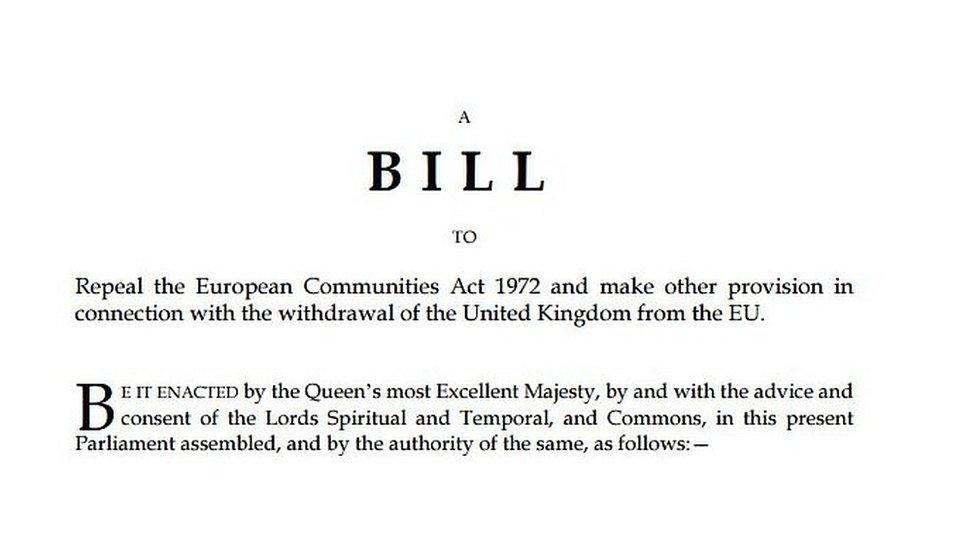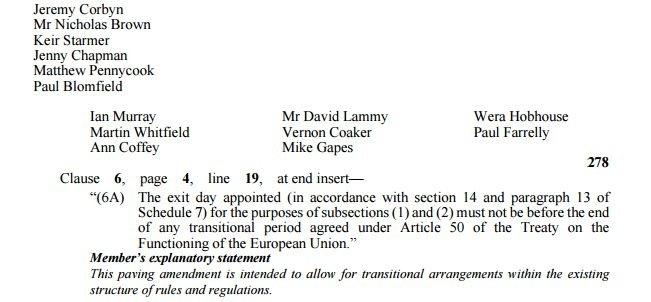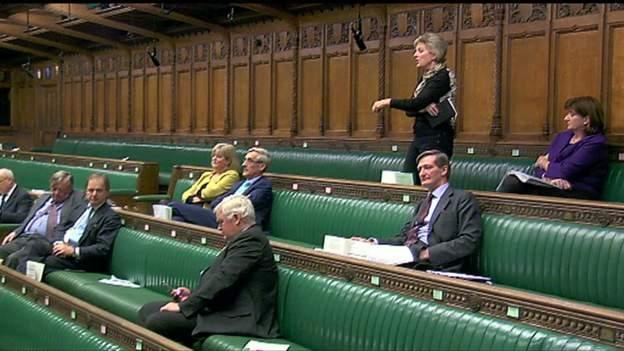Let's do the maths
- Published
- comments

OK, let's look at the numbers.
How worried should the government be, after the first 10 Commons votes on the detail of the EU (Withdrawal) Bill, external?
It won the 10 votes held by majorities of 266, 250, 20, 20, 21, 16, 12, 18, 16 and 265. And it is the narrower votes, where Labour weighed in, that will be studied most closely.
So far, only one Conservative, the former Chancellor Ken Clarke, voted against the government. But on the front of Wednesday's Daily Telegraph a further 14 Tory MPs were pictured with him, under the headline "The Brexit mutineers".
These are the Tory rebels who could - on the face of it - turn those figures decisively against the government, and force through amendments to the bill, in the teeth of ministerial resistance.
My impression, watching the debate, was that they are becoming quite a cohesive unit, sitting in a group, hear-hearing and murmuring support as their colleagues speak, and pulling faces and muttering derision when their opponents (on their own side) are on their feet.
Some now joke about buying pirate hats to wear in celebration of their mutineer status, as they sit in their enclave in the Chamber.
And even those who have been called in to explain themselves to their constituency parties remain pretty undaunted and committed to the amendments they have signed. And they hint that other Conservatives, who have not signed any amendment may also surface to defy their whips.

Let's take the final vote on Tuesday night, on Amendment 278 as a baseline, external, because it makes several useful points: the raw figures on the Opposition side were Labour 241 (out of 260); SNP 35 (a full house); Lib Dem 11 (Vince Cable wasn't there); Plaid 4 (a full house, again); Green 1; Independent (Lady Hermon) 1.
Assume that the 14 mutineers identified by the Telegraph join Ken Clarke in the lobby, and that Sir Vince Cable votes, and suddenly the Aye vote for a hostile amendment would be 310, with the combined forces of the Conservatives and the DUP down to 299.
But note that that total was bolstered by two Labour Brexiteers (Kate Hoey and Graham Stringer) plus Anne Marie Morris, (a Conservative currently suspended from the whip, and therefore listed, at the moment as an independent) and their total is then 302 - so an opposition majority of eight.
Factor in the two tellers on each side, and the MPs who chaired parts of the debate as members of the Chairmen's Panel, and are thus barred from voting - and the remaining MPs who missed the division would not have been enough to change the result if they had taken part and had toed their party line.
Also missing were three MPs who have had the whip suspended - Labour's Kelvin Hopkins, a strong Brexiteer, and Jared O'Mara; and the Conservative Charlie Elphicke. Again, not quite enough to tip the balance. But factor in all the various groups of missing MPs and the numbers do begin to look very tight - and the really critical ones are the Labour Brexiteers, who might conceivably side with the government in some big votes.

Many of the Conservative rebels sit in a corner of the Commons chamber (seen to the right of the picture: Dominic Grieve, Anna Soubry and Nicky Morgan)
In all of Tuesday's votes, three Labour MPs, Kate Hoey, Graham Stringer and Frank Field, voted with the government - but they are far from the only Brexiteers on the Labour benches.
And beyond the ranks of the genuine Brexiteers, remember that 70% of Labour MPs sit for constituencies which voted Leave in the referendum. Even if they were, themselves, Remainers, they might not dare risk a vote which could be presented as anti-Brexit.
Labour leadership sources believe there are perhaps three hard core Brexiteers who could not be shifted - and that the rest will toe the line, perhaps with a few abstentions. Others on the Labour benches predict 10 plus votes with the government on key amendments, with maybe the same number of abstentions - enough to ensure the government wins.
I suspect the Labour Brexiteers will swing according to the particular issue. In the phrase of Brexit-supporting Labour MP John Mann, they could vote to shape Brexit - to preserve existing EU-derived employment rights, for example - but would not vote to break Brexit.
Tough choice for Labour MPs
So if Labour sought to frustrate the referendum verdict, they could well break ranks in numbers sufficient to swing the vote the government's way. The choice before them could be very tough - vote to sustain Brexit, or to destabilise, maybe even bring down, a Conservative government.
On the government amendments to set the leaving date in stone, they might feel this was not a Brexit-critical issue - after all, this is a change to the original bill and could be painted as a gimmick....
On other amendments, they might think their voters would be less persuadable. On the other hand, some may even calculate that their voting wouldn't count against them in the context of a general election - arch Labour Leaver Kate Hoey survived pretty comfortably in pro-Remain Vauxhall; Remainer Paul Farrelly voted against triggering Article 50 before the last election, and saw his vote shoot up by 9.8%, in 63% pro-Leave Newcastle Under Lyme, perhaps saving his bacon in a knife-edge contest.
The whole situation is eerily reminiscent of the 1972 vote on the European Communities Act, external, which took Britain into the then EEC.
The then Tory Chief Whip Francis Pym sent a memo to Prime Minister Edward Heath advising him not to impose a three-line whip on his troops, because the Labour rebellion in support of Britain joining would outweigh the Tory rebellion against….
And seeking to clamp down on his own rebels risked hardening the party lines, when it was best for his government to keep them permeable.
The calculations 45 years on, seem much the same.